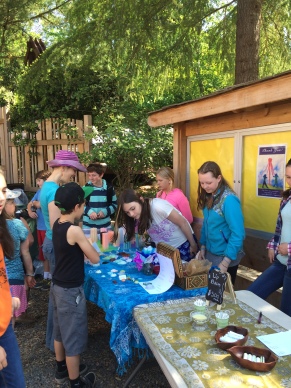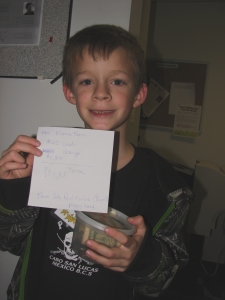Unfortunately, Solid Ground is ending its sponsorship of the Penny Harvest program on June 30th, 2014. Penny Harvest advocates are still looking for a new home for the program.
Environmental stewards. Philanthropists. Community leaders. These are not usually titles we give to kids, even if the phrase “making a difference” is constantly pushed throughout school curricula. Is there a way that schools can facilitate the kindly intentions of students who are just at the beginning stages of a lifetime of learning? With the Penny Harvest program, one can truly call these little humanitarians, from kindergarten to 12th grade, bighearted superstars.

Penny drive at Adams Elementary School, 2011
Bringing the drive to Seattle
In 1992, Solid Ground (then known as the Fremont Public Association) partnered with Family Services (now Wellspring Family Services) and Atlantic Street Center to create Common Cents to teach area youth about homelessness through a spring coin drive paired with educational presentations. Around $40,000 per year was raised to serve families experiencing homelessness, all the while engaging thousands of students in philanthropic efforts.
In 2005, the program became affiliated with the New York-based Common Cents and changed the name of the local operation to Penny Harvest. The model of the program also shifted from funding three specific organizations to allowing youth to select who and what to fund, and expanded to include a stronger focus on social justice work. Penny Harvest is now a national service-learning program engaging students between the ages of four and 18 in processes of philanthropy including gathering pennies, grant making and taking action as leaders in their community. The program introduces students to the power of giving and volunteerism, and thus they learn the right steps to drive change in their communities. Organizations that have received donations include everything from safe housing for youth and families, animal welfare, environmental justice to individual sponsorship of a homeless man in the neighborhood.
Find a penny, pick it up…

Kathleen Penna in a van full of sacks
Different than your typical fundraiser, the Penny Harvest was more like a scavenger hunt at times. “Pennies are usually very accessible, especially to young people. You can find them everywhere. [Students] look under their couches, ask their neighbors. They have big jars that they keep in their schools,” says Kathleen Penna, Community Development Program Coordinator (and former Penny Harvest Program Coordinator) at Solid Ground. “They’re also something that we don’t often think of as useful anymore, because you can’t buy anything with [just] pennies.” When asked what was her favorite part about the actual collection of pennies, Kathleen says, “It was cool to see the giant piles of pennies. We had U-Haul vans that were full of pennies.”
This sort of energetic strategy can really get kids engaged, allowing them to experience the difficult, hands-on work it takes to fundraise. It also increases excitement around getting involved in the decision making process on where to allocate the funds, a task for which the students are 100% in charge.

Ana Lucía Degel as a Penny Harvest Youth Board member, June 2005
One former Penny Harvest participant, Ana Lucía Degel, says that this kind of empowerment “has profoundly shaped my ability to examine my role in my community, my own privilege, and my determination to affect change through the work that I choose to do.” Ana Lucía is currently an Education Specialist with Treehouse, providing dropout prevention services and education case management for youth who have experienced foster care. “Penny Harvest planted the seed within me that I am capable of dreaming change that seems impossible, and I can find ways to take steps towards that change by working within my community.”
This sort of sentiment can be heard from students and adults alike. “Our main goal is that young people learn that they can and do make a difference at a very early age,” says Mike Beebe, former Penny Harvest Program Manager at Solid Ground. “Learning about community input, mapping community assets, community organizing. What we can do working together is so much more powerful than what we can do as one person. In some ways, I think that challenges the narrative in our country around individualism,” says Mike.
Steering the ship
Penny Harvest Youth Boards consisted of 10 members and were open to any student who committed to it. This past year, there were a couple of members who started in 2nd grade and are now of driving age. Of their role over the last few months, Kathleen says, “They are really steering the ship of the program.”
Ana Lucía says that one of her favorite parts of the program was being on the Board. “I really began to feel empowered to make a difference in my community,” she says.
The Board typically met every Monday and talked about the visioning and transitioning of the program, wrote and sent out appeal letters, and planned events like the Youth Philanthropy Summit.

Youth Board meeting in 2002
The Summit was always a special time of year. “This year we had about 140 students who came to the Summit. They got the chance to meet about 30 different organizations from across the city that do a wide variety of work and really connect with them on a different level,” explains Kathleen. After that initial meeting, students then workshopped and dug into the root causes of issues they care about most. “It’s really complicated and complex and compacted. It was really cool to see everyone from the 16-year-old Youth Board members to the kindergartners who were there,” says Kathleen.
Continuing the mission
Sometimes it seems crazy to think that something as small as a penny could ever make a difference in anyone’s life. A piece of currency that has been, for some years now, considered almost unnecessary in our economy and one that is constantly on the verge of becoming obsolete. However, the mission of the Penny Harvest program is to turn one person’s inept coinage into a student’s philanthropic development that benefits the community.
“The most meaningful social change that’s happened in this country, it’s the youth and young adults who’ve led that effort,” Mike explains to describe the program’s impact. “But we’re even taking it down to kindergarten age and saying, ‘Well, they can do that right now.’ We don’t have to wait until they’re high school or college age, or wait till they’re in their 30s. Let’s not waste time. Let’s support them in doing that now.”
If you are interested in assisting Penny Harvest in finding a new host organization, please contact Common Cents through Mike Beebe at 206.354.7312 or mpbeebe@gmail.com.
Filed under: Solid Ground News | Tagged: Common Cents, ending homelessness, Penny Harvest, youth leadership, youth philanthropy | 2 Comments »















